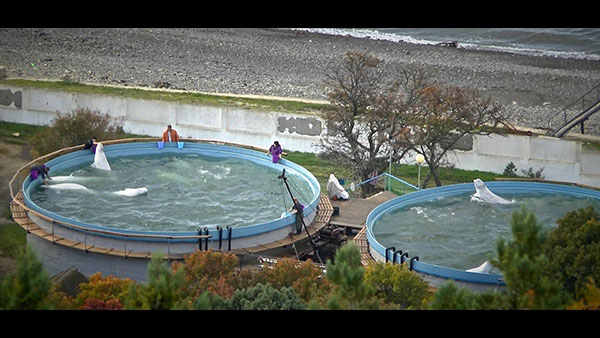
‘Born to be Free’ will be the first ever documentary to reveal the seamy side of the Russia’s International trade in wild caught cetaceans for the entertainment industry as well as the condition of cetaceans living in captivity there. The film is produced by independent Russian studio, Baikal Cinema.
In 2012, the story of 18 beluga whales captured in the Sea of Okhotsk in Russia destined for the Georgia Aquarium, Sea World and other marine parks in the US, stirred up the anti-captivity and animal welfare community and the media.
Eventually in 2013, after a public consultation that collected around 9,000 public submissions, NOAA (National Ocean and Atmospheric Administration) banned the import which marked a considerable accomplishment for environmentalists.
Yet at no time, did anyone in Russia consider setting the animals free. Instead, the formerly wild belugas were turned into long-term prisoners. They remain crammed into narrow tanks, kept under guard behind a fence unseen by accidental witnesses.
It was these events that inspired and motivated the film team who went on to inspect numerous dolphinaria around Russia. They were confronted with the horrific realities of the captivity business, namely how capture, transportation and animal trade deals are carried out, and they witnessed firsthand the psychological damage caused to captured cetaceans during taming and training.
This iniquitous industry involves a large number of agents and organizations, and huge sums of money. Russia is the main supplier of beluga and killer whales to the world’s oceanaria. The system is built up from a broad network which includes both suppliers and foreign customers. The film’s central topic is certainly not restricted to geographical borders.
’Born to be Free’ features well-known scientists and experts on marine mammals including Dr. Naomi Rose, Animal Welfare Institute (USA); Dr. Samuel Hung, Chairman of Hong Kong Dolphin Conservation Society; and Dr. Vsevolod Belkovich, Chief of Marine Mammals Department Institute of Oceanology (Russia), who provide detailed accounts of what exactly happens to cetaceans’ psyche and physiology in captivity.
Dr Naomi Rose, Marine Mammal Scientist, Animal Welfare Institute, said: “This film has the potential to do for Russia what „Blackfish” has done for the United States. It can open the eyes of the public to the suffering that goes on behind the scenes at dolphinariums.

“Capturing and confining whales and dolphins for entertainment is morally wrong – these actions cause incredible trauma and harm to creatures who are intelligent, socially complex, emotional, and long-lived.
“People innocently buy tickets believing the dolphins and whales are happy, but they are not and we must educate people about this. This film can help accomplish that education – it can be part of revealing the truth, from the dolphin’s point of view.”
A feature of this film is the participation of freedivers who have extensive experience of swimming and communicating with wild dolphins and whales in their natural habitat. The resulting stunning footage, filmed underwater in the open ocean, only serves to make the contrast between freedom and captivity even more evident.
Producer and director Gayane Petrosyan, said, “I am sure that a straight-talking movie about dolphinaria and oceanaria is more essential for humans than for dolphins.
“A society which incessantly cultivates a human’s right to deprive other rational beings of their freedom for the mere sake of the former’s whims and entertainment, under no circumstances can be defined as healthy or as advocating humanitarian values.
“It may be slightly immodest to say so about the film you are working on, but I believe very strongly that such films as Born to be Free give us a chance to become better“.
The film is currently in the final stages of editing and postproduction. This month (January 2015), the film crew announced a crowdfunding campaign to raise funds to support the project’s completion. The crowdfunding target aims to reach at least $30,000 and will run untill early March.
Link to the campaign on Indiegogo:
https://www.indiegogo.com/projects/born-free-documentary/x/9521725#home
The film has already made a lot of friends and fans around the globe. Since the start of the campaign on Indiegogo it has received support from Earthrace Conservation Organization, an international non-profit organisation dedicated to tackling the serious issues that threaten oceans and marine life around the world, which has invested towards the film’s postproduction.
Beverley Bailey, Earthrace Conservation, said: „Born to be Free will be a real game changer, not just in Russia but across the world. No-one watching it will fail to be moved by the beauty of belugas in their natural habitat and hearts will be broken by the incontrovertible truth of the horrific treatment of captive cetaceans in Russia. Everyone currently involved in the captivity trade who has witnessed the impact of 'Blackfish’ had better watch out for the white whales – they’re coming for you.”
Link to the film’s trailer on Youtube:
https://www.youtube.com/watch?v=cEtcpJKYz8g&x-yt-ts=1422411861&x-yt-cl=84924572
The Team
Producer and director Gayane Petrosyan is an award-winning documentalist, author of more than 20 documentaries, and Chief Executive of independent documentary studios, Baikal Cinema. Gayane’s core activity includes films dealing with social problematic, environmental conservation and a harmonious cohabitation of humans with nature.
Creative producer and writer, Tatiana Beley is an underwater film maker who recorded the beluga whales in the White Sea (Russia). All underwater filming was performed in free mode without scuba in order not to scare the animals away.
Yulia Petrik also took part in the film. She is Russia’s first freediving champion, a prize winner of international competitions, and an underwater film maker who also shot footage for ‘Born to be Free’ including with dolphins in the Black Sea.
More information on the original 18 beluga whales:
http://www.nmfs.noaa.gov/pr/permits/georgia_aquarium_belugas.htm
http://www.earthraceconservation.org/black-days-white-whales-1
Photo credit: Maxim Lanovoy: Captured beluga whales, taken at Srednyaya, Nr Nahodka, Far East Russia
Born to be Free: 'Born to be Free
